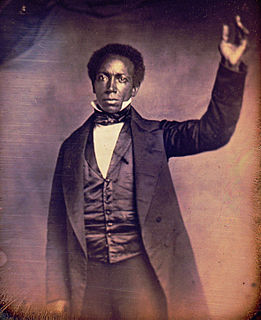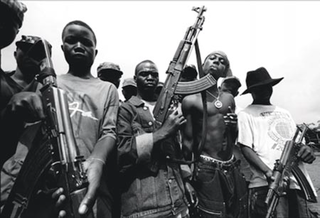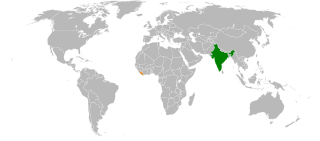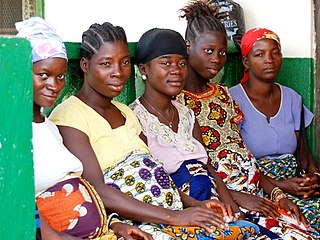Related Research Articles

Liberia, officially the Republic of Liberia, is a country on the West African coast. It is bordered by Sierra Leone to its northwest, Guinea to its north, Côte d'Ivoire to its east, and the Atlantic Ocean to its south-southwest. It has a population of around 5 million and covers an area of 111,369 square kilometers (43,000 sq mi). English is the official language, but over 20 indigenous languages are spoken, representing the numerous ethnic groups who make up more than 95% of the population. The country's capital and largest city is Monrovia.

Liberia is a country in West Africa which was founded by free people of color from the United States. The emigration of African Americans both free and recently emancipated, was funded and organized by the American Colonization Society (ACS). The mortality rate of these settlers was the highest in accurately recorded human history. Of the 4,571 emigrants who arrived in Liberia between 1820 and 1843, only 1,819 survived.
The Krahn are an ethnic group of Liberia and Ivory Coast. This group belongs to the Kru language family and its people are sometimes referred to as the Wee, Guéré, Sapo, or Wobe. It is likely that Western contact with the Kru language is the primary reason for the development of these different names.

Monrovia is the capital city of the West African country of Liberia. Located on the Atlantic Coast at Cape Mesurado, Monrovia had a population of 1,010,970 as of the 2008 census. With 29% of the total population of Liberia, Monrovia is the country's most populous city.

Edward James Roye served as the fifth President of Liberia from 1870 to his overthrow in 1871 and subsequent death. He had previously served as the 4th Chief Justice of Liberia from 1865 until 1868. He was the first member of Liberia's True Whig Party to serve as president.

Maryland County is a county in the southeastern portion of Liberia. One of 15 counties that comprise the first-level of administrative division in the nation, it has two districts. Harper serves as the capital with the area of the county measuring 2,297 square kilometres (887 sq mi). As of the 2008 Census, it had a population of 136,404, making it the seventh most populous county in Liberia. The flag of Maryland County is widely regarded in the vexillological community to be an example of an incredibly terribly designed flag.
Ruth Sando Fahnbulleh Perry was a Liberian politician. She served as the interim Chairman of the Council of State of Liberia from 3 September 1996 until 2 August 1997, following the First Liberian Civil War. After eleven international peace attempts between 1990 and 1995 to end the civil war in Liberia, the attempts appeared to succeed. The interim Council of State consisted of a civilian chairman, as well as members of warring factions: Charles Taylor, United Liberation Movement of Liberia for Democracy-K leader Alhaji Kromah, Liberia Peace Council leader George Boley, and two other civilians.

The Second Liberian Civil War began in 1999 when a rebel group backed by the government of neighbouring Guinea, the Liberians United for Reconciliation and Democracy (LURD), emerged in northern Liberia. In early 2003, a second rebel group, the Movement for Democracy in Liberia (MODEL), emerged in the south, and by June–July 2003, Charles Taylor's government controlled only a third of the country.

Ellen Johnson Sirleaf is a Liberian politician who served as the 24th President of Liberia from 2006 to 2018. Sirleaf was the first elected female head of state in Africa.
The University of Liberia is a publicly funded institution of higher learning located in Monrovia, Liberia. Authorized by the national government in 1851, the University opened in 1862 as Liberia College. UL has four campuses; including the Capitol Hill Campus in Monrovia, Fendell campus in Louisiana, outside Monrovia, the Medical School Campus in Congo Town and the Straz-Sinje Campus located in Sinje Grand Cape Mount County. The University enrolls approximately 18,000 students and is one of the oldest institutions of higher learning in West Africa. It is accredited by the Liberian Commission on Higher Education.

India–Liberia relations are the foreign relations between India and the Republic of Liberia. India is represented in Liberia through its embassy in Abidjan and an active honorary consulate in Monrovia since 1984. Liberia was represented in India through its resident mission in New Delhi which subsequently closed due to budgetary constraints.

Women of Liberia Mass Action for Peace is a peace movement started in 2003 by women in Monrovia, Liberia, Africa, that worked to end the Second Liberian Civil War. Organized by Crystal Roh Gawding and social workers Leymah Gbowee and Comfort Freeman, the movement began despite Liberia having extremely limited civil rights. Thousands of Muslim and Christian women from various classes mobilized their efforts, staged silent nonviolence protests that included a sex strike and the threat of a curse.

Leymah Roberta Gbowee is a Liberian peace activist responsible for leading a women's nonviolent peace movement, Women of Liberia Mass Action for Peace that helped bring an end to the Second Liberian Civil War in 2003. Her efforts to end the war, along with her collaborator Ellen Johnson Sirleaf, helped usher in a period of peace and enabled a free election in 2005 that Sirleaf won. She, along with Ellen Johnson Sirleaf and Tawakkul Karman, were awarded the 2011 Nobel Peace Prize "for their non-violent struggle for the safety of women and for women's rights to full participation in peace-building work."

United Nations Security Council resolution 1509, adopted unanimously on 19 September 2003, after recalling all previous resolutions on the situation in Liberia, including Resolution 1497 (2003), the Council established the 15,000-strong United Nations Mission in Liberia (UNMIL) to assist in implementing a ceasefire and peace agreement.

Human rights in Liberia became a focus of international attention when the country's president, Ellen Johnson Sirleaf, was named one of the three female co-winners of the 2011 Nobel Peace Prize, all of whom were cited "for their non-violent struggle for the safety of women and for women's rights to full participation in peace-building work".

The Liberia women's national football team is the women's national team representing the country in international competitions. They have played in five FIFA recognised matches.

The extent of gender inequalities varies throughout Liberia in regard to status, region, rural/urban areas, and traditional cultures. In general, women in Liberia have less access to education, health care, property, and justice when compared to men. Liberia suffered two devastating civil wars from 1989–1996 and 1999–2003. The wars left Liberia nearly destroyed with minimal infrastructure and thousands dead. Liberia has a Human Development Report ranking of 174 out of 187 and a Gender Inequality Index rank of 154 out of 159.

Fatima Massaquoi-Fahnbulleh was an educator in Liberia, West Africa. After completing her education in the United States, she returned to Liberia in 1946, where she contributed much to the cultural and social life of the country.
Grace Beatrice Minor is an Americo-Liberian politician who was a close ally of president Charles Taylor. She served as Senator for Montserrado County and was President Pro Tempore of the Senate from 2002 to 2003.
Maude Amelia Morris, née Lyon was a Liberian women's rights activist and rubber farmer.
References
- ↑ Ernest Jerome Yancy (1967). Historical Lights of Liberia's Yesterday and Today. Around the world Publishing House. p. 212.
- ↑ Africa Quarterly. Indian Centre for Africa. 22: 25. 1982 https://books.google.com/books?id=jsc_AAAAYAAJ.Missing or empty
|title=(help) - ↑ "The Origin of Liberian women entry in Government". 16 February 2015. Retrieved 1 February 2021.
| | This article related to women's history is a stub. You can help Wikipedia by expanding it. |
| | This Liberia-related article is a stub. You can help Wikipedia by expanding it. |